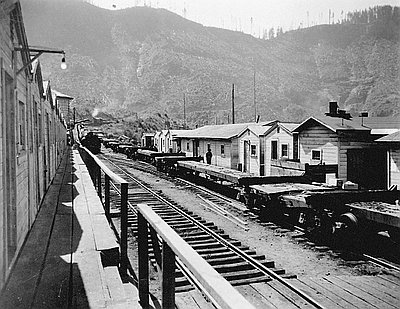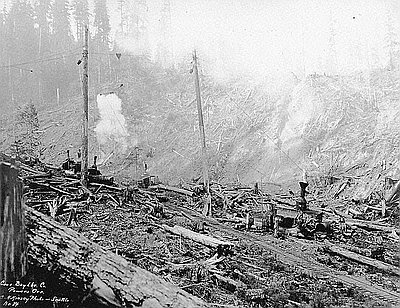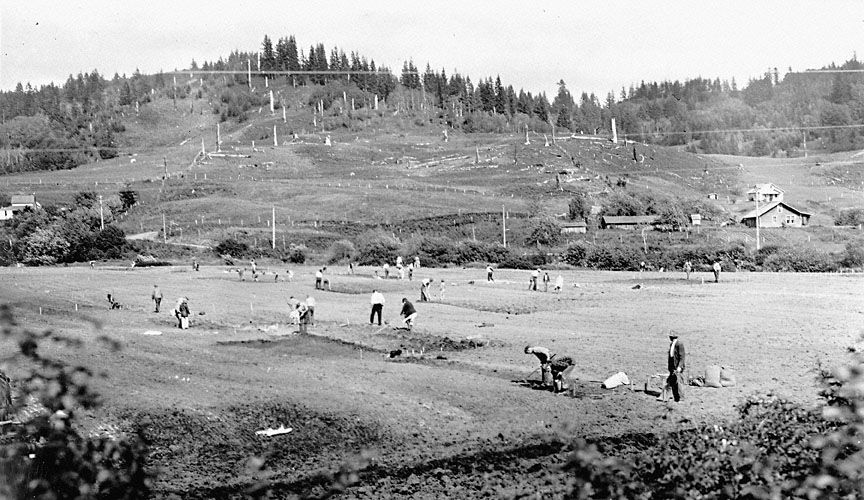- Catalog No. —
- CN 019512
- Date —
- June 1932
- Era —
- 1921-1949 (Great Depression and World War II)
- Themes —
- Government, Law, and Politics, Labor, Trade, Business, Industry, and the Economy
- Credits —
- Oregon Historical Society
- Regions —
- Coast
- Author —
- Oregon Journal Collection
Co-operative Garden in Toledo
This photograph was published in the Oregon Journal on June 5, 1932. It shows employees of the Pacific Spruce lumber mill working in a co-operative garden in the Lincoln County town of Toledo.
Although Oregon was not hit as hard by the Great Depression as some other parts of the country, historian Terrence O’Donnell notes that “Oregon, too, had its soup kitchens and Hoovervilles and Civilian Conservation Corps (CCC) camps…..In 1934, Governor Julius Meier summed up the general situation: ‘Oregon is dead broke.’”
Oregonians responded to the hard times of the 1930s in a variety of ways. Many, like the timber workers shown in the photograph above, were forced to fall back on subsistence gardening, hunting, and fishing. In the spring of 1932, the Loyal Legion of Loggers and Lumberman, a timber workers union, called a meeting at the Lincoln County courthouse to discuss ways of alleviating the county’s dire economic straits. The Oregon Journal reported that “there was one suggestion that met with universal approval, and that was the plan to assist co-operatively every needy family to grow a garden.” They noted that the World War I slogan “Grow a Garden and Win the War” was modified into the “world depression slogan, ‘Grow a Garden and Win the War Against Depression.’”
The Pacific Spruce Corporation and C.D. Johnson Lumber Company leased about a dozen acres of land so their employees could grow some of their own food. Within days about a hundred families had signed up for a 40-by-100-foot plot. Most of them planted half the plot with potatoes, the rest with corn, squash, beans, and peas. The company paid to have the land plowed and fertilized, and sold the potatoes and seeds to the employees at cost. “The Lincoln county depression remedy,” the Oregon Journal declared, “is wrapped up in the neat little package labeled ‘Co-operative Community Gardening.’”
Many other coast residents also relied on subsistence gardening, hunting, and fishing during the Depression. Ione Reed and her husband Ike, for example, lived on an isolated, nearly self-sufficient homestead in the Coast Range near Florence. They lived very frugally, rarely purchased anything but the bare necessities, and grew, hunted, or bartered for most of their own food. Historian William Robbins also found that, in Coos County, the availability of subsistence resources helped to mitigate the effects of the Depression. “The depression brought poverty and suffering to Coos communities,” he concludes, “but no starvation and little social trauma.”
Further Reading:
O’Donnell, Terence. That Balance So Rare: The Story of Oregon. Portland, Oreg., 1988.
Reed, Ione. Pioneering in Oregon’s Coast Range: Surviving the Depression Years. Brownsville, Oreg., 1982.
Robbins, William G. Hard Times in Paradise: Coos Bay, Oregon, 1850-1986. Corvallis, Oreg., 1988.
Written by Cain Allen, © Oregon Historical Society, 2006.
Related Historical Records
-
Mining, Lumbering, and Shipbuilding
The southern Oregon Coast between Coos Bay and Gold Beach experienced an early and mostly unproductive mid nineteenth-century gold rush, which gave Gold Beach its name. The gold …
-
Camp Two, Coos Bay Lumber Company
A moving community of loggers is depicted in this 1930 photograph. From the 1890s through World War II, major logging operations in Oregon were railroad-based, with trackage extending …

-
Coos Bay Lumber Company Steam Donkeys
The steam donkey, invented in 1880, greatly increased the efficiency of logging operations in Oregon’s forests. It replaced animal labor, which could not work as fast in rainy …

